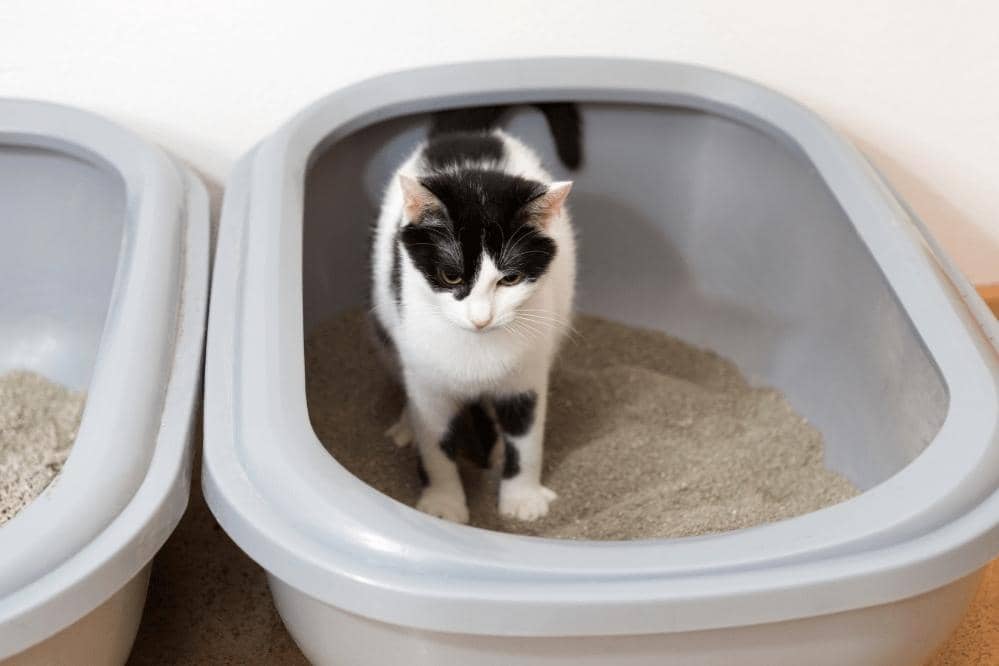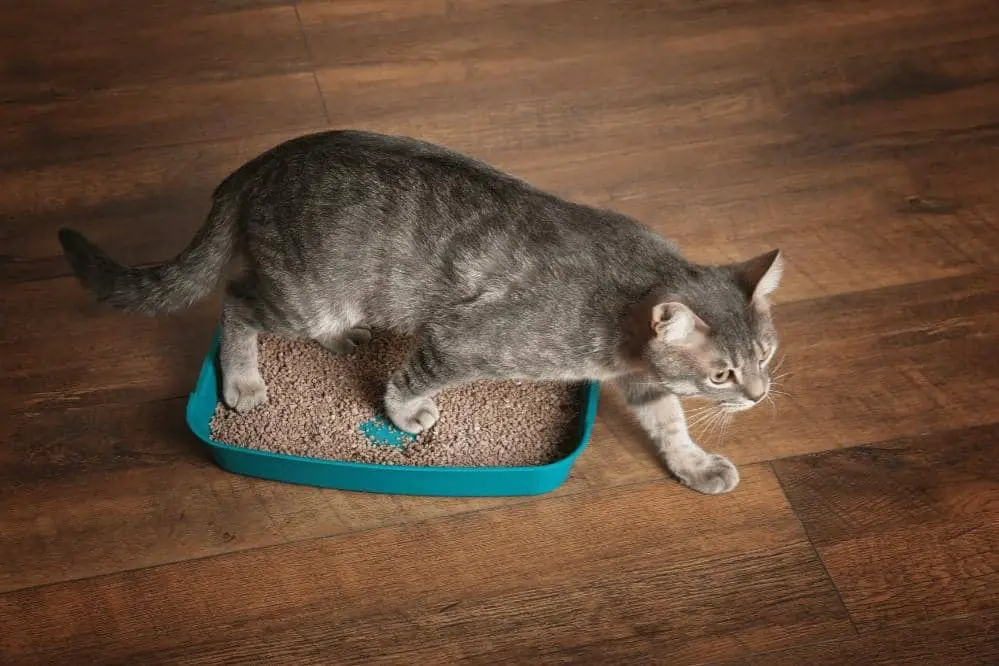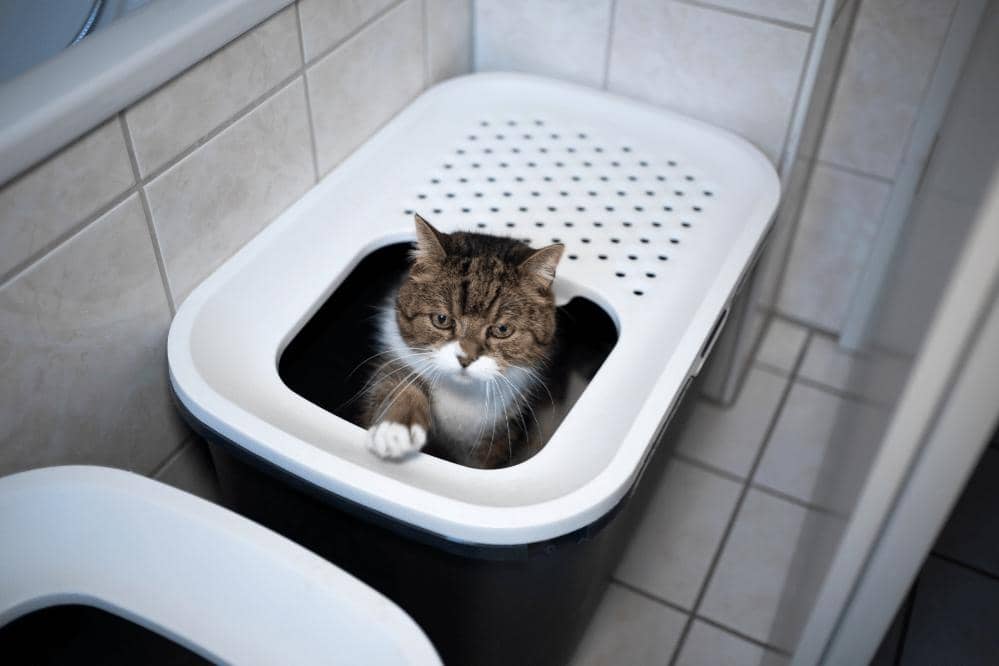Why Does My Cat Sleep in the Litter Box?

Anyone who has ever owned a cat knows that they are known for being strange creatures with minds of their own. They can be fickle creatures, liking you one moment and then running away from you the next. Or, they might be extremely picky creatures, enjoying treats of a particular flavor one day and then refusing to eat it ever again. For all the strangeness that cats can bring to the house, there are some problems that might seem more baffling than your cat having an attitude. For instance, cats are known for being sleepy animals, as they can easily sleep for up to 16 hours a day. Typically, you would find a cat sleeping in your bed, in their bed, or another comfortable spot, but some owners will find their cats sleeping in their litter boxes. A cat sleeping in the litter box is easily the equivalent of a person sleeping beside the toilet.
While it might seem amusing or baffling at first, a cat who sleeps in its litter box regularly is showing signs of a problem. In the food chain, cats are in a unique position of being both predators and prey. There are many animals that cats can stalk and hunt down, but there are more than a few predators that can take down a cat without a second thought. Because of this, cats will instinctively hide pain and discomfort. Rather than crying out if you pet over an area that is sore, cats will display their pain and grievances in strange ways, such as sleeping near or in its litter box. Before you rush your cat to the emergency room though, it is important to understand all of the reasons why a cat might be found sleeping in its litter box.
Consider Where the Cat Came From
If you have recently adopted a cat or taken a young cat home from the shelter, there’s a decent chance that your cat will want to sleep in or near its litter box. This is because in shelter and adoption situations, there is limited room for the cat to have space. This usually results in the cat sleeping beside its litter box in the shelter it came from, especially if it was a shelter that keeps cats in small cages. After all, to a cat, the closed space of a litter box can feel safe. As your cat transitions into its new routine in your home, it may not fully realize that it can sleep anywhere it wants, and it may feel comfort and familiarity by continuing to sleep in its litter box.
If your cat is doing this seemingly because of where it came from before it was adopted by you, consider giving your cat some time to explore your house and find a new space to sleep that is safe. If the behavior continues, consider getting your cat checked by a vet or consider teaching your cat not to sleep there.
Consider Your Cat’s Stress
Cats are animals that can get stressed out just as easily as people can. Of course, there are going to be different factors that influence that stress. There are three kinds of stress that can lead a cat to sleep in its litter box. For one, if you have multiple cats in the house and not enough litter boxes for them all, a more dominant cat will sleep in its litter box to assert that it is that specific cat’s territory. Another form of stress would be fear of the unknown, such as a newly adopted cat, a move to a new location, or something similar. A litter box is naturally full of the cat’s own smell, and in a new environment where there are new and unknown smells, being in a place that smells “safe” (such as the cat’s own smell) might bring comfort. Finally, when female cats go into labor, they will want to find a private, secluded, and closed space to give birth. If a box or other container is not provided for the cat, it may decide that its litter box is the safest place to give birth.
For territorial cats, you will need to make sure that each cat in the house has its own litter box to use, plus one extra box for any cat to use whenever. This will allow each cat to “own” its own litter box, avoiding territory feuds. If the behavior continues, consider consulting a behavior specialist. For cats that are scared and stressed, it may just take some time for the cat to adjust to the new situation, depending on what’s going on. If the cat does not choose to come out of the litter box on its own, you may need to make the litter box inhospitable for the cat to sleep in. Finally, for cats in labor, you may have some time to provide a more comfortable space for the mother cat to go have her kittens. A box with a washable blanket (or one that you do not mind discarding) is usually enough. If the mother cat is far enough along in labor, you should not disturb the cat. Instead, make sure that the mother cat eventually moves out of the litter box once the kittens are ready to be moved.
Health Problems
Cats are incredibly clean animals. They spend hours upon hours a day grooming their fur. They always bury their droppings in the litter. Some cats will even bury food that they don’t like. If a cat has learned due to experience that it has issues with its bladder and repeatedly doesn’t make it to the litter box in time, it may begin to feel anxious if it is not close to the litter box at all times. In a cat’s brain, the perfect solution to this is to sleep in the litter box.
If your cat seems to start sleeping in the litter box more often, accompanied by meowing while using the litter or other signs of distress, it is a sign your cat has something wrong with its kidneys or bladder and needs to be examined by a veterinarian.



